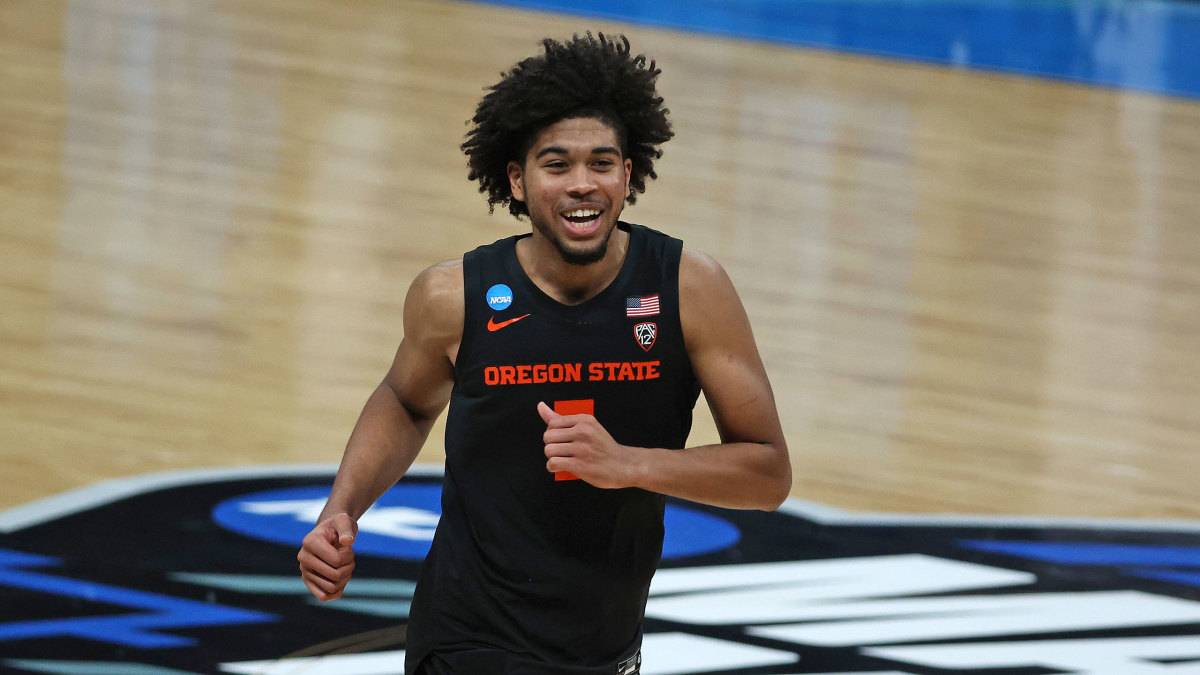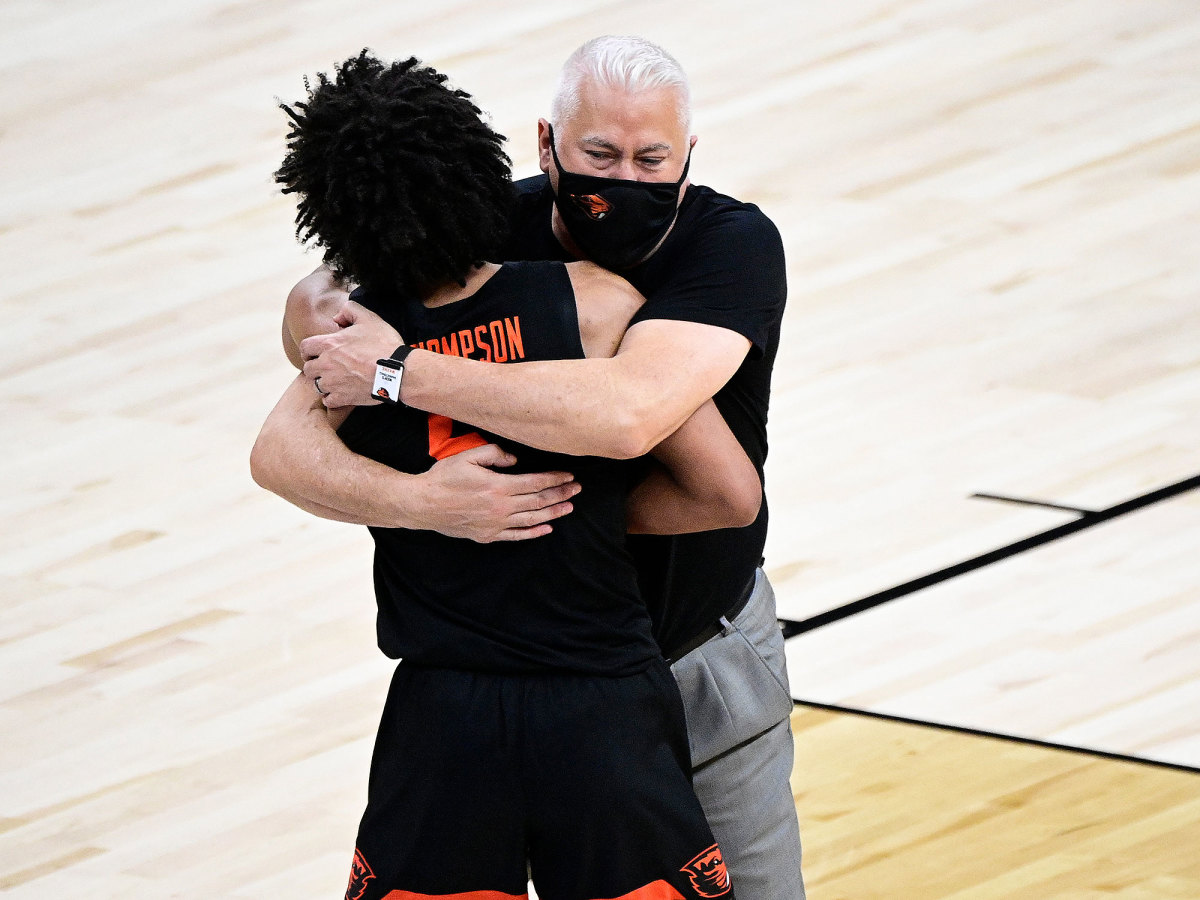Oregon State Snuffs Out Loyola Chicago to Continue Its Improbable March
INDIANAPOLIS — UCLA’s Jules Bernard is a 73% foul shooter. With three seconds left in the Pac-12 tournament quarterfinals against Oregon State, Bernard went to the line for two free throws. If he made them both, the Bruins would win and the Beavers’ season would quietly end on a Las Vegas afternoon with a 14–13 record.
Bernard made one of two, sending the game into overtime. Once there, Oregon State prevailed, 83–79. The Beavers haven’t lost since.
These are the twists of March fate that can separate the magical from the mundane. A good foul shooter misses one, and suddenly a hungry team takes that crack of daylight and turns it into a sun-drenched run of historic proportion.
They were picked to finish last in the league before the season. They were on the verge of a season-ending loss. Sixteen days later, the unlikely Pac-12 tourney champions have turned this NCAA tournament opportunity into a stunning rampage. Just like that, Oregon State is only the second No. 12 seed in tourney history to make a regional final, and is 40 minutes from being the lowest-seeded team to ever reach a Final Four.

“Can we cut in?” Coach Wayne Tinkle said upon sitting down for his postgame press conference Saturday, after the Beavers throttled Loyola Chicago, 65–58. After earning the chance to dance, Tinkle and the Beavers have jitterbugged all over Indy, winning twice in Bankers Life Fieldhouse and once in Hinkle Fieldhouse.
“There's no doubt in our guys' minds,” Tinkle said. “They really believe that this is their time. It's what we said before we left the locker room, that we're not going to get rattled. This is our time. It's meant to be.”
Preordained or not, none of this Oregon State run has been flukish. This was a third straight authoritative victory over a higher-seeded team: from dominating No. 5 Tennessee for 40 minutes to leading No. 4 Oklahoma State for the final 33 minutes to taking over against No. 8 Loyola for the final 25, Oregon State has been no-doubt better than everyone it has faced in this tourney.
The first two games were won with timely shot-making and smashing opponents on the glass. This inartistic slog was won at the defensive end, with a hybrid zone Tinkle and his staff concocted to gum up the precise Loyola offense.
“I don’t know if it gave us more life or threw them off-guard a bit,” said Oregon State senior guard Ethan Thompson.
Oh, it definitely threw Loyola off-guard. The Beavers beat the Ramblers at their own game, out-guarding the opposition in a slow-motion grinder.
Oregon State watched Porter Moser’s offense slice up Midwest Region top seed Illinois last round. The Beavers also certainly saw Georgia Tech use a zone to take an early 13–3 lead on Loyola in the first round. So Tinkle broke out a zone that borrowed some principles from a 1-1-3 that Montana coach Stew Morrill ran when Tinkle was a player there in the 1980s, plus other iterations he’s used over the years.
“We knew we had to have a different gameplan for these guys,” Tinkle said. “They’re so good at what they do, if you let them run it they’re going to make you look silly.”
Oregon State certainly wasn’t going to allow the Ramblers to run everything around and through big man Cameron Krutwig. He’s a point center, with teammates curling around him for handoffs and passes and driving off his very wide screens. The Beavers’ zone limited Krutwig’s touches—and when he did get the ball, Oregon State didn’t let him pound the ball and get into a comfortable rhythm.
“We knew we had bodies to throw at him,” Tinkle said.
With Krutwig unable to facilitate as much as usual, the burden shifted to his teammates—and they were brutal shooting the ball. The Ramblers had 16 points at halftime, with players not named Krutwig missing 17 of 18 shots. It was a horror show that only improved marginally in the second half.
When Loyola finally did get around to making some shots, Oregon State answered with timely baskets. Warith Alatishe, a transfer from Nicholls who averaged fewer than 2 points a game there as a freshman in 2019, was too athletic for the Ramblers to contain. Jarod Lucas, who took a long time getting going, canned a couple of big shots. And Thompson was the best player on the floor, scoring 22 to go with four rebounds and four assists.
Thompson and Zach Reichle are four-year Beavers who are finally getting their moment in the sun after years of the program treading water. After early losses to Wyoming and Portland, this team started to show some promise with three straight Pac-12 wins in January, then another three-game streak near the end of the regular season. They took a belief with them to Vegas, despite the program having never won the Pac-12 tourney.

“Our guys never wavered,” Tinkle said, and that included their coach. This is his seventh year on the job, and after making the NCAA tourney his second season, this has been a long time coming.
“I’ll be honest,” Tinkle said. “You hear some murmurs in the background when we're going through some things, but we knew as a staff and we knew the people in our foxhole. We're never going to waver. And we never cut any corners to try to win at all costs.”
Pac-12 member Arizona is serving a self-imposed postseason ban. USC is going through the NCAA infractions process after a former assistant coach was caught up in the federal corruption probe. Oregon’s Nike connections have come under scrutiny.
There has been no smoke at Oregon State—but also no NCAA tournament success. Until now. The 12th-seeded Beavers are believers, and they’re on the cusp of making history.
